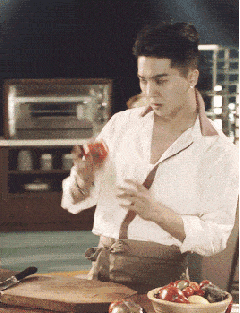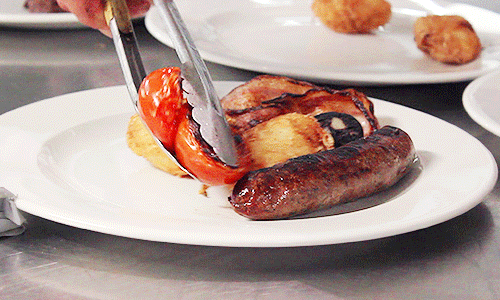當(dāng)前位置: Language Tips> 雙語新聞
A tomato is actually a fruit — but it's a vegetable at the same time
關(guān)于番茄是水果還是蔬菜的爭論由來已久。早在一百多年前的美國,就有人將這個問題鬧上了法庭。兩派各執(zhí)一詞,煞是熱鬧。那么番茄究竟是水果,還是蔬菜呢?答案是“隨你高興”,因?yàn)檫@兩種說法都沒錯。

The explanation lies in the two different ways that "fruit" is defined. First, it is true that scientifically speaking, tomatoes are fruits.
對“fruit(水果,果實(shí))”的定義有兩種不同說法。首先,從科學(xué)角度講,番茄的確屬于果實(shí)。
According to Merriam-Webster, a fruit is "the usually edible reproductive body of a seed plant." In a blog post, the dictionary explained it in simpler terms: "Any thing that grows on a plant and is the means by which that plant gets its seeds out into the world is a fruit."
根據(jù)《韋氏詞典》,果實(shí)通常指“種子植物的可食用繁殖體”。《韋氏詞典》博客上的一篇文章給出了更簡單的釋義:“果實(shí)是長在植物上、能夠?qū)⒅参锓N子帶到外面的部分。”

That definition includes apples, tomatoes, and anything else that grows from a plant and contains seeds. (Cucumbers, peppers, pumpkins, and avocados are all fruits too, according to science.)
這個定義包含了蘋果、番茄等任何有種子的植物部位。從科學(xué)意義上講,黃瓜、辣椒、南瓜、牛油果都屬于果實(shí)。
Vegetables, on the other hand, have a slightly murkier definition. It's a word we use to group together a wide range of plants whose parts are edible and herbaceous, like roots, stems, and leaves. The critical distinction is that, according to the dictionary, a vegetable must be part of a plant or the whole plant itself, while fruits are just the means by which certain plants spread their seeds.
另一方面,蔬菜的定義要更模糊一些。我們把一大批具有根莖葉等可食草本部分的植物歸類為蔬菜。根據(jù)《韋氏詞典》,二者的關(guān)鍵區(qū)別是:蔬菜必須是植物的一部分或整體本身,而果實(shí)只是特定植物傳播種子的方式。
"The thing a tomato plant produces isn't a part of the plant itself, any more than the egg a chicken lays is part of the chicken, or the apple is part of the tree on which it grew," Merriam-Webster wrote.
《韋氏詞典》稱:“番茄不是植物本身的一部分,最多就像蛋與雞、蘋果與蘋果樹的關(guān)系一樣。”
But the confusion arises because "vegetable" isn't a botanical classification so much as it is a culinary one. And "fruit" can be a culinary term, too — described as "having a sweet pulp associated with the seed" and "used chiefly in a dessert or sweet course," according to Merriam-Webster. So scientifically, fruits don't have to be sweet, but in the kitchen, most people would classify the fruits that fall on the savory side, like tomatoes, as vegetables.
但問題在于:“蔬菜”更多是一種烹飪分類,而不是一種植物學(xué)分類。與此同時,《韋氏詞典》稱,“fruit”也可以是一種烹飪食材,指“擁有帶種子的甜果肉”、“主要用于甜點(diǎn)或甜食”的東西。也就是說,從科學(xué)角度,果實(shí)不必是甜的;但從烹飪角度,大多數(shù)人會根據(jù)果實(shí)的味道將其歸類為蔬菜,比如番茄。

Nutritionists recognize the terms as they are commonly used, and tomatoes are listed as a vegetable under USDA guidelines.
營養(yǎng)學(xué)家根據(jù)番茄的主要用途將其列為蔬菜,而美國農(nóng)業(yè)部的指導(dǎo)方針也將番茄列為蔬菜。
Even the Supreme Court has weighed in on the issue.
甚至連美國最高法院都曾介入過這個問題。
1883年3月3日,美國頒布了新的關(guān)稅法,規(guī)定進(jìn)口蔬菜需要繳納10%的關(guān)稅,而進(jìn)口水果則不需要。當(dāng)時紐約海關(guān)認(rèn)為番茄是蔬菜,需交稅。然而,商人約翰?尼克斯卻認(rèn)為,根據(jù)植物學(xué)定義,番茄屬于水果,不應(yīng)該被征稅。于是,尼克斯直接將海關(guān)稅收員告上法庭,要求退還被強(qiáng)制征收的稅。
此案一路鬧到了美國最高法院,直到6年后,法庭才做出最終裁定。法官認(rèn)為:
"Botanically speaking, tomatoes are the fruit of a vine, just as are cucumbers, squashes, beans, and peas. But in the common language of the people … all these are vegetables which are grown in kitchen gardens, and which, whether eaten cooked or raw, are, like potatoes, carrots, parsnips, turnips, beets, cauliflower, cabbage, celery, and lettuce, usually served at dinner in, with, or after the soup, fish, or meats which constitute the principal part of the repast, and not, like fruits generally, as dessert."
“從植物學(xué)上講,番茄是藤本植物的果實(shí),就像黃瓜、南瓜、黃豆、豌豆一樣。但在人們的日常語言中,這些都是種在菜園里的蔬菜。它像土豆、胡蘿卜、歐洲蘿卜、蕪菁、甜菜、菜花、卷心菜、芹菜、生菜一樣,無論生吃還是熟吃,通常都是在晚餐里搭配著湯、魚、肉食用。它是正餐的一部分,而不像水果一樣,通常作為甜點(diǎn)。”

其實(shí),蔬菜和水果本來就不是一個科學(xué)的分類,更像是一種習(xí)慣,沒有確切的定論,所以,你開心就好。
英文來源:商業(yè)內(nèi)幕網(wǎng)
編譯:董靜
審校:yaning
上一篇 : 杰克遜傾斜舞是這樣實(shí)現(xiàn)的
下一篇 :
關(guān)注和訂閱

關(guān)于我們 | 聯(lián)系方式 | 招聘信息
電話:8610-84883645
傳真:8610-84883500
Email: languagetips@chinadaily.com.cn